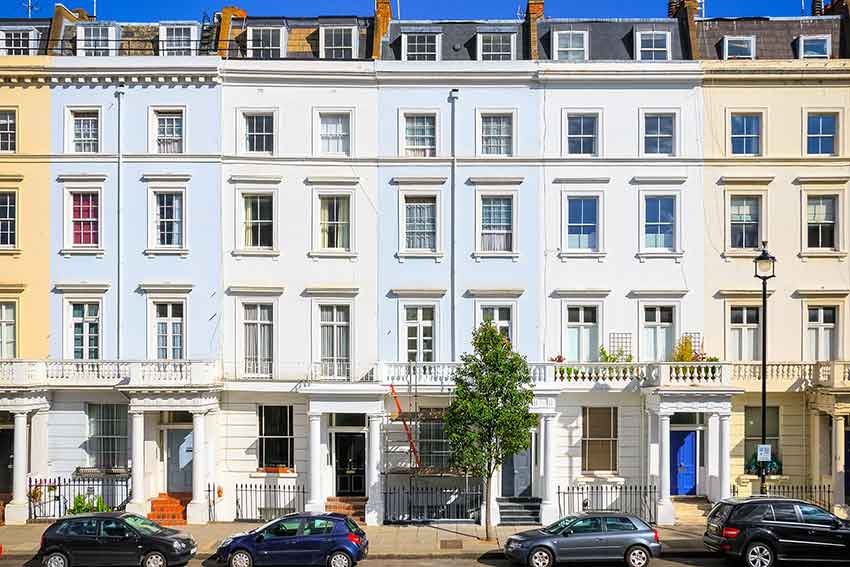What are rent controls?
In the United Kingdom, rent controls were first introduced in 1915 to regulate housing costs after they had skyrocketed due to increased demand.
The main aim of rent controls is to protect tenants from rising rents and to prevent unfair evictions when tenants can no longer pay their rent.
Globally, rent controls are a popular tool for regulating rents in certain areas. Rather than capping rent at a fixed amount, these controls typically allow rent increases, but only within a set percentage limit. This means that landlords or managers can increase rent, but only within a regulated percentage increase.
Rent controls are often introduced to address financial challenges such as the cost of living crisis or to promote fairness in the private rented sector. They can apply either during a tenancy – landlords cannot increase rent while the property is occupied – or between tenancies.
Why should there be rent control in London?
In a Blueprint Report 2019Sadiq Khan stressed the need for rent controls in London, arguing that they played “a key role in improving housing affordability”.
Currently average rent in Greater London is £2,109 per month, which is 43% higher than the average rent in England. Between 2021 and 2022Private renters in London spent around 35% of their income on rent, making the city the least affordable place in the UK.
Rent controls in London could provide tenants with more stability and more affordable housing options. When rents are kept under control, tenants are more likely to stay in their homes, reducing the frequency – and cost – of tenant turnover for landlords.
However, it is clear that while rent controls can be beneficial for tenants, they can be less beneficial for landlords and letting agencies.
What impact does rent control have on the private rental sector?
According to a report by Institute of Economics (IEA)While rent controls can achieve their primary objective of reducing rents, they have significant negative consequences.
Dr. Konstantin A. Kholodilin, the author of the IEA report, analyzed 65 studies on rent controls and found that 56 of them achieved the intended reduction in rents. However, the introduction of rent controls in one area often leads to rent increases in other, uncontrolled areas.
Other negative impacts identified in the report include:
- Reduced supply of rental apartments: Landlords may be discouraged from renting or investing in properties.
- Reduced construction activity: In areas with rent controls, developers may be less inclined to build new rental properties.
- Lower quality of living: Landlords may have less incentive to maintain or improve their properties.
- Limited tenant mobility: Tenants may be reluctant to leave their rent-controlled apartments and move into properties without rent control.
- Increased misallocation of housing: Due to the popularity of controlled properties, tenants may be forced into apartments that do not meet their needs.
- Higher rents in uncontrolled areas: Rent controls can drive up rents in areas without such regulations as landlords try to recoup their losses.
While rent controls can help curb rising rents in certain areas, they often lead to broader, unintended consequences that can negatively impact the community as a whole.
Will there ever be rent controls in London?
The Mayor of London, Sadiq Khan, has expressed a strong desire to introduce rent controls in the capital. While his previous proposals were rejected by the Conservative government, the current Labour-led Parliament could open the door to such measures.
However, the government has made it clear that no discussions about rent controls have taken place so far. Current press releasethey stated: “Solving the UK’s housing crisis is one of our top priorities and giving tenants in need more rights and security is a key priority for this government, but there have been no discussions with the Mayor of London about introducing rent controls.”
This does not mean that rent controls are off the table for London or the rest of England. In May, Prime Minister Keir Starmer spoke about the need to stop landlords exploiting tenants through bidding wars, stating: “We need to have a plan to stop them from driving up rents further and further.”
In the Speech of the King Earlier this year, Labour introduced the Tenant Rights Act as a counter-proposal to the Conservatives’ Tenant Reform ActThis new legislation aims to strengthen tenants’ rights and protections, including measures to end bidding wars between landlords and letting agents over rents.
Although rent controls are not yet explicitly mentioned in the Bill, estate agents should keep themselves informed about the Tenants’ Rights Bill when Parliament reconvenes in September.
👑 Find out the key takeaways from the King’s Speech that estate agents should know 👑




